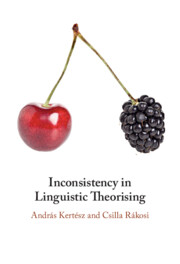Book contents
- Inconsistency in Linguistic Theorising
- Inconsistency in Linguistic Theorising
- Copyright page
- Dedication
- Contents
- Figures
- Tables
- Preface
- Abbreviations and central terms
- 1 Introduction
- Part I The State of the Art
- Part II Paraconsistency
- Part III Plausible Argumentation
- 6 From Paraconsistency to Plausible Argumentation
- 7 Inconsistency and Theory Change
- 8 The Treatment of Inconsistency in Optimality Theory
- 9 The Heuristics of Inconsistency Resolution
- Part IV Summary
- References
- Index
6 - From Paraconsistency to Plausible Argumentation
from Part III - Plausible Argumentation
Published online by Cambridge University Press: 23 June 2022
- Inconsistency in Linguistic Theorising
- Inconsistency in Linguistic Theorising
- Copyright page
- Dedication
- Contents
- Figures
- Tables
- Preface
- Abbreviations and central terms
- 1 Introduction
- Part I The State of the Art
- Part II Paraconsistency
- Part III Plausible Argumentation
- 6 From Paraconsistency to Plausible Argumentation
- 7 Inconsistency and Theory Change
- 8 The Treatment of Inconsistency in Optimality Theory
- 9 The Heuristics of Inconsistency Resolution
- Part IV Summary
- References
- Index
Summary
The present chapter is devoted to the problem of how the limits of the paraconsistent treatment of inconsistency can be transgressed.anticipates some basic properties of the p-model. In , we will first offer a brief survey of the structure, the function, and the treatment of inconsistencies in Baltin’s () paper with respect to different analyses of degree word complement clauses. In , we will apply the paraconsistent logic introduced into Baltin’s argumentation. We will see, however, that this result is not satisfactory, because paraconsistent logic cannot grasp the process of the continuous emergence and resolution of inconsistencies. Consequently, in , we will briefly present the central terms and tenets of the p-model. In , we will apply this finding to the reconstruction of Baltin’s () argumentation, and into another case study on that of Zubizarreta (). Finally, in , we will summarise our solution to the problem raised.
Keywords
- Type
- Chapter
- Information
- Inconsistency in Linguistic Theorising , pp. 131 - 188Publisher: Cambridge University PressPrint publication year: 2022

